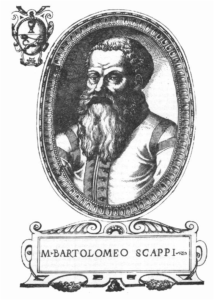In De Standaard en Het Nieuwsblad verscheen een interview met Jozef over middeleeuwse kookboeken naar aanleiding van een nieuwe uitgave van Forme of cury (1390). (De versie van Het Nieuwsblad is uitgebreider dan die van De Standaard.) De Wereld van Sofie van Studio Brussel pikte het item op en interviewde Jozef nog eens over hetzelfde onderwerp. Het recept Toerte van ooghen, ooren, swesers, ende cloottiens van cabrettiens werd op een grappige wijze voorgelezen in de originele versie. Op de website staat de vertaling, gemaakt door Marleen Willebrands, al wordt dit er niet bij vermeld. O ja, dat van de oude koning die warm moet eten heeft de interviewster uiteraard verkeerd begrepen, maar het is wel grappig. Zie Jozef’s reactie hierover onder het artikel bij De Standaard.
Author: Hilde Sels
Lezing over Vlaamse kookboeken in het Musée Départemental de Flandre, Hazebrouck
 On Thursday 5 June I gave a presentation on ‘L’Histoire des livres de recettes en Flandre à l’époque moderne’ during the conference ‘Plateau Gourmand’ in the Musée Municipal d’Hazebrouck in France. The ‘Plateau Gourmand’ conference is part of the exposition ‘Gourmandise’ which takes place from 4 April until 6 Juli in the Musée Départemental de Flandre, temporarily housed in the municipal museum of Hazebrouck in the north of France (the Hôtel de la Noble-Cour in Cassel is undergoing repairs). More information on this exposition, the conference day and other activities you’ll find on the website of the Conseil Général du Nord of France. (Illustratie: ‘Nature morte’ by Jacob Van Es, of of the paintings exhibited.)
On Thursday 5 June I gave a presentation on ‘L’Histoire des livres de recettes en Flandre à l’époque moderne’ during the conference ‘Plateau Gourmand’ in the Musée Municipal d’Hazebrouck in France. The ‘Plateau Gourmand’ conference is part of the exposition ‘Gourmandise’ which takes place from 4 April until 6 Juli in the Musée Départemental de Flandre, temporarily housed in the municipal museum of Hazebrouck in the north of France (the Hôtel de la Noble-Cour in Cassel is undergoing repairs). More information on this exposition, the conference day and other activities you’ll find on the website of the Conseil Général du Nord of France. (Illustratie: ‘Nature morte’ by Jacob Van Es, of of the paintings exhibited.)
(Nederlands) Bartolomeo Scappi, het biografisch mysterie opgelost
In Lieve schat, wat vind je lekker besteden we ruime aandacht aan het leven van Bartolomeo Scappi, wiens Opera dell’arte del cucinare een belangrijke bron was voor het Koocboec van Antonius Magirus en waar de BBC op 27 december 2007 om 21 uur een documentaire over uitzond.

Hoewel de auteur van de Opera met naam en toenaam vermeld staat op de titelpagina (klik op de afbeelding om ze in detail te bekijken), was het leven van Bartolomeo Scappi lange tijd omgeven met mysterie en gissingen. Vooral zijn geboorteplaats was onderwerp van discussie. Onderzoekers voerden met vuur argumenten aan om te bewijzen dat Bartolomeo Scappi geboren was in hun stad. Bologna en Venetië, maar ook andere Noord-Italiaanse plaatsen, streden daarbij om de eer. Bologna omwille van de aanwezigheid van een familie Scappi in deze stad sinds de twaalfde eeuw en het feit dat Bartolomeo Scappi er in dienst was van kardinaal Lorenzo Campeggi. Venetië omwille van de Continue reading “(Nederlands) Bartolomeo Scappi, het biografisch mysterie opgelost”
Vlaamse kookboeken tot 1800
In 1984 I wrote an article on Flemish cookery books from 1500-1800 for the now defunct French language monthly Belgia2000. The electronic version of that article is printed below. The full reference is:
HILDE SELS “Les livres de cuisine flamands des temps modernes” in: Belgia2000. Toute l’histoire de Belgique. Décembre 1984, no. 13, pp. 34-42.
P. 34
Le livre de cuisine flamand est une source peu étudiée dans (le domaine de) l’histoire de l’alimentation. Les livres culinaires illustrent pourtant de façon appropriée l’histoire de la gastronomie. Ils donnent un aperçu des recettes que certaines gens ont trouvées assez intéressantes à noter, à rassembler et – finalement – à éditer. En ce qui concerne la Flandre, 8 manuscrits et 7 ouvrages imprimés des Temps Modernes sont parvenus jusqu’à nous (Lire en fin d’article la liste détaillée de ces sources et les références concernant leur conservation). Continue reading “Vlaamse kookboeken tot 1800”
